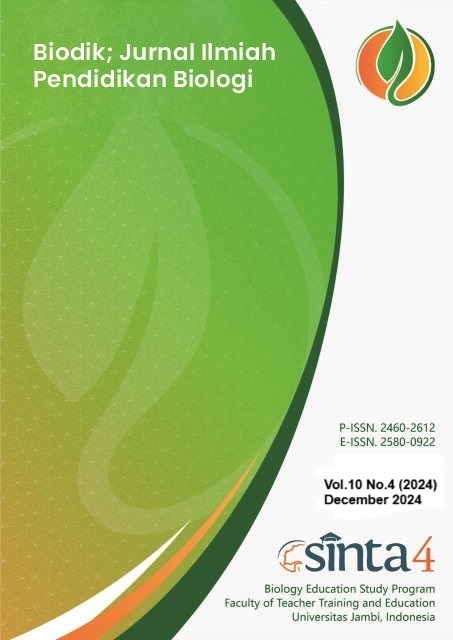Implementasi Model KNos-KGS Berbasis 6 Literasi Keterampilan Abad 21 Untuk Meningkatkan Hasil Belajar Siswa
(KNos-KGS Learning Model Based on 6 Literacy Skills for the 21st Century to Improve Student Learning Outcomes at Anjir Pasar Public Senior High School)
DOI:
https://doi.org/10.22437/biodik.v10i4.37508Abstract
21st century learning needs to integrate the learning process by training literacy skills that are very important for students. This study is a Classroom Action Research which aims to improve the learning outcomes of SMAN students with the KNoS-KGS learning model based on 6 21st century literacy skills. This Classroom Action Research lasted for 2 cycles consisting of 4 meetings. Based on the research results obtained, in the first cycle and the first meeting 43% (13 students) obtained a passing grade, while 57% (15 students) had not obtained a passing grade. Then in the second meeting of the first cycle 96.44% (27 students) obtained a passing grade, while 3.56% (1 student) had not obtained a passing grade. Furthermore, in the third meeting of the second cycle 96.44% (27 students) obtained a passing grade, while 3.56% (1 student) had not obtained a passing grade. Until the last meeting all students (100%) were able to obtain a passing grade. Based on these findings, it can be said that the KNoS-KGS learning model based on 6 literacy skills of the 21st century is effective in improving the learning outcomes of high school students. The novelty of this study lies in the learning process that integrates 6 literacy skills of the 21st century. This study is still limited because the samples used are still not too many.
Abstrak.
Pembelajaran abad 21 perlu mengintegrasikan proses pembelajaran dengan melatihkan kemampuan literasi yang sangat penting bagi siswa. Penelitian ini merupakan penelitian Tindakan kelas (PTK) yang bertujuan untuk meningkatkan hasil belajar siswa SMAN dengan model pembelajaran KNoS-KGS berbasis 6 literasi keterampilan abad 21. Penelitian Tindakan Kelas (PTK) ini berlangsung selama 2 siklus yang terdiri atas 4 pertemuan. Berdasarkan hasil penelitian yang diperoleh, pada siklus pertama dan pertemuan pertama 43% (13 siswa) memperoleh nilai tuntas, sementara 57% (15 siswa) belum memperoleh nilai tuntas. Kemudian pada pertemuan kedua siklus pertama 96,44% (27 siswa) memperoleh nilai tuntas, sementara 3,56% (1 siswa) belum memperoleh nilai tuntas. Selanjutnya, pada pertemuan ketiga siklus kedua 96,44% (27 siswa) memperoleh nilai tuntas, sementara 3,56% (1 siswa) belum memperoleh nilai tuntas. Hingga pada pertemuan terakhir seluruh siswa (100%) dapat memperoleh nilai tuntas. Berdasarkan temuan ini, dapat dikatakan pembelajaran model KNoS-KGS berbasis 6 literasi keterampilan abad 21 efektif untuk meningkatkan hasil belajar siswa SMA. Kebaruan penelitian ini terdapat pada proses pembelajaran yang mengintegrasikan 6 keterampilan literasi abad 21. Penelitian ini masih terbatas karena sampel yang digunakan masih tidak terlalu banyak.
Downloads
Downloads
Published
How to Cite
Issue
Section
License
Copyright (c) 2024 Rezky Nefianthi, Rabiatul Adawiyah, Yulianti Hidayah

This work is licensed under a Creative Commons Attribution-NonCommercial-ShareAlike 4.0 International License.
Copyright Notice
Authors who publish with Biodik : Jurnal Ilmiah Pendidikan Biologi agree to the following terms:
- For all articles published in Biodik : Jurnal Ilmiah Pendidikan Biologi, copyright is retained by the authors and grant the journal right of first publication with the work simultaneously licensed under a Creative Commons Attribution-ShareAlike 4.0 International Licensethat allows others to share the work with an acknowledgment of the work's authorship and initial publication in this journal.
- Authors are able to enter into separate, additional contractual arrangements for the non-exclusive distribution of the journal's published version of the work (e.g., post it to an institutional repository or publish it in a book), with an acknowledgment of its initial publication in this journal.
- Authors are permitted and encouraged to post their work online (e.g., in institutional repositories or on their website) prior to and during the submission process, as it can lead to productive exchanges, as well as earlier and greater citation of published work (See The Effect of Open Access).

















